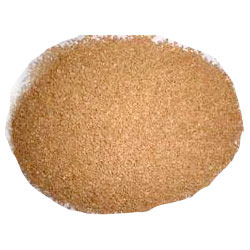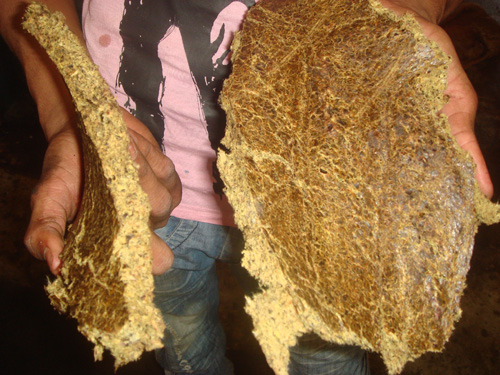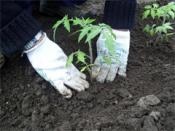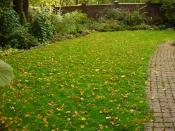Search
Login
Organic fertilizers on the European market. Types and application
In organic farming, enriched land with nutrients is the key to successful cultivation of cultivated plants. Unfortunately, not everyone in the garden has ideal proportions of natural ingredients, if organic fertilizers are not available in the garden, they are purchased in stores.
Choosing eco-fertilizers, you can be sure that there are no raw materials in the package with the addition of inorganic substances, this fact proves the certification mark and reviews of gardeners about the quality of fertilizers of a particular manufacturer.
Content
- Guano (seabird litter)
- Granular manure
- Vermicompost video
- Blood meal
- Brown coal (coal ash)
- Seaweed Extract Fertilizers
- Cotton Flour (Cotton Cake)
- Alfalfa flour
- Corn gluten
Guano (seabird litter)
The use of bird droppings for soil has been known for a long time, but its use is difficult, not everyone has the opportunity to collect the litter in the required quantity. An interesting substitute came to domestic fertilizer - litter of penguins from the coast of Peru. Penguin litter is rich in calcium, magnesium and nitrogen, contains a high concentration of other micro and macro elements. Based on guano, activators are produced that accelerate the decomposition of compost.

Using guano, there is no need to dilute it with other organic fertilizers - the litter contains everything you need for plants.
Another advantage of guano is its 100% environmental friendliness, penguins eat exclusively natural food, unlike birds raised on poultry farms (they receive food containing antibiotics and hormones, respectively, chicken droppings that go on sale do not fully comply with organic standards).
Granular manure
Granular manure is easy to use, manure does not lose its beneficial properties when converted to fermented granules. The fertilizer is odorless, acquires an aesthetic appearance, it is easy to measure, avoiding exceeding the norm.
Granular manure retains its beneficial properties for three years, is useful for all types of plants, including indoor plants.

Vermicompost
Biohumus is formed by the decomposition of plant waste using California earthworms. The high nutrient content in vermicompost is similar to compost, which explains its popularity in soil improvement. Biohumus in addition to nutrition, heals the soil by destroying pathogenic microflora, increases the immunity of plants, and resistance to adverse conditions.
Manufacturers offer biohumus in two versions - liquid biohumus and biohumus in the form of a granular mass. The first type is introduced under the plants during irrigation, it is convenient for sheet processing. Granular vermicompost should be selected carefully - there should not be other mineral fertilizers or sawdust in the composition, such vermicompost is used to prepare the soil for planting.
Blood meal
Blood meal contains a high percentage of nitrogen, phosphorus, iron, and potassium. Fertilizer is ideal for early vegetables. It is rarely used by gardeners, it has a significant drawback - the smell of flour attracts dogs. Soil requires quite a lot of fertilizer, about 5 kg per 50 m of the garden plot.

Brown coal (coal ash)
Dust of brown coal or as a substitute for it - coal ash (which is more affordable for many), contains many trace elements, increases the pH of the soil. Brown coal dust has a long decomposition period and good sorption properties; it is used to improve the structure of heavy and sandy soils.

Seaweed Extract Fertilizers
Fertilizers with seaweed extract contain a large number of macro- and microelements, positively affect the soil structure, stimulate the growth of beneficial microorganisms in the soil. It is proved that kelp extract increases the resistance of plants to diseases. Fertilizer stimulates the growth of the root system, accelerates the process of photosynthesis and inhibits the growth of weeds.

Cotton Flour (Cotton Cake)
Cotton flour is ideal for plants that prefer an acidic environment (azaleas, rhododendrons, roses), fertilizer helps reduce soil alkalinity. All components of cotton flour are released slowly and the risk of overdose is minimal, and cotton fertilizer is recommended for heavy soils.

Alfalfa flour
Alfalfa hay, crushed into powder, contains nitrogen, potassium and phosphorus less than other fertilizers, but has a special effect on root growth due to the growth hormone triacontanol. There are two ways to use alfalfa flour - coating the soil and watering. Flour is added to the soil during digging or to the holes when planted.

Diluted flour in water is insisted for a day in a warm place, then water the plants, after 3 weeks watering is repeated. Fresh alfalfa is used as siderate, alfalfa hay is suitable for mulching.
Corn gluten
Corn gluten is an animal feed, but it is also suitable as an organic fertilizer. Corn fertilizer is rich in nitrogen, contains a small amount of potassium and phosphorus. In addition, gluten replaces the chemical herbicide, being its natural counterpart.

Organic herbicides, of course, cannot fully protect the site from all weeds, but they can destroy their roots at an early stage of growth. Soil cultivation begins before the appearance of the first sprouts, i.e., in early spring. The herbicidal effect of corn gluten lasts up to 6 weeks, for this reason it is better not to sow the soil in this period. As a fertilizer, gluten is used only two months after planting cultivated plants, otherwise they may die from a herbicidal effect.





